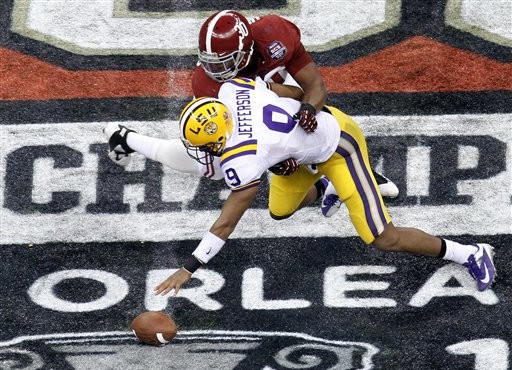Terrible title game just what BCS needed
Jan 10, 2012, 4:33 PM | Updated: 4:56 pm

I wasn’t all that excited to sit through another LSU-
Alabama matchup in Monday’s BCS National Championship Game
in New Orleans.
After all, we’d seen Field Goal Fest the Game of the
Century back in November. And yes, it provided an overtime
and dominating SEC defense, but for the most part it was
boring.
Despite the BCS honks who claim that the regular season in
college football is indeed a playoff system that weeds out
the weak, we were subjected to another Crimson Tide-Bayou
Bengals match for the crystal football trophy with the Dr.
Pepper logo on it.
At least the first meeting between the teams was close.
Alabama got 5 field goals from a kicker who was sporting
Richard Marx’s hairdo and a late pile-on touchdown from
Trent Richardson in a 21-0 whitewashing of LSU to claim
their second BCS title in three years. LSU managed 92
yards of offense with a quarterback who looked like he had
never played the position before and a normally bold coach
who was afraid to make a change.
Couple that with Brent Musberger’s incessant Honey Badger
references and a horrific leg injury suffered by
Alabama’s C.J. Mosley, and this game was virtually
unwatchable.
This was the 14th year of the BCS, which is supposed to
ensure the two best teams play one game to determine a
champion. So much criticism about the system’s failure or
inability to match up the two best teams has piled up over
the years. The system really only works when there are
two and only two undefeated teams from major conferences
left standing at the end of the regular season. That
doesn’t happen often.
But the games that the BCS formula has spit out after
their fancy computers do their thing have been terrible
for the most part. In the fourteen-year history of the
BCS, only thrice has the final game been memorable to the
average college football fan — Ohio State’s controversial
overtime win over Miami in 2003, Texas’ upset of USC in
2006 and I’ll even bend a little and include Auburn’s
victory over Oregon in 2011.
The rest? Blech! The first BCS title game between
Tennessee and Florida State at the Fiesta Bowl in January
of 1999 is one of the worst football games I’ve ever
watched with my own two eyes. How about USC rolling over
Oklahoma 55-19 in Miami in 2005? The most memorable moment
of that game was Ashlee Simpson being booed for her
halftime show performance. Or Florida’s dominating victory
over Ohio State in 2007 when the Buckeyes managed 82
yards?
Only twice in the BCS’ history has the championship game
been determined by less than 7 points. On the flip side,
there have been blowouts of 27, 21, 23 and 36 points. The
average margin of victory in the 14 BCS title games? A
whopping 14.4 points. That’s not what you’d expect when a
computer is determining the two best teams to play for all
the [fill in the blank with sponsor’s product].
And despite Monday’s game being billed as “The Game of the
Century II”, the fans know better. The
television rating’s for Alabama’s win were the lowest for
a championship game in the BCS era. People are tuning
out the other manufactured BCS bowl matchups, too. The
Orange Bowl featuring West Virginia and Clemson drew a 4.5
rating, the lowest rated bowl game of the BCS
era.
Opponents of the BCS who are steadfast enough not to watch
the seemingly endless parade of meaningless football
exhibition games have long contended that if people don’t
watch, the BCS will go away and be replaced by a playoff
system similar to the one that every other competitive
sport on the face of the Earth employs to crown a
champion.
That could be coming. Immediate reaction from Monday’s
debacle has spurred movement. Matt Hayes of Sporting News wrote the
following Monday:
Years from now, this BCS National Championship
Game won’t be remembered so much for Alabama’s utter
domination of LSU as it will the beginning of radical
change in college football. A national playoff is coming,
everyone.It’s only a matter of what it looks like.
“It gets done,” a high-ranking BCS official told Sporting
News Monday evening.Here’s how: over the next six months, the leaders of the
sport will meet at least four times to iron out a plan
that protects the importance of the regular season—the one
aspect BCS leaders believe separates the game from every
other—while embracing a new frontier for the poll-driven
sport.
The old saying goes “it’s always darkest before the dawn”.
So I guess in a weird way, I should be thanking the BCS,
LSU and Alabama for providing one dark, hard-to-watch
football game.
It may just have been bad enough to spark a big change for
the better.






